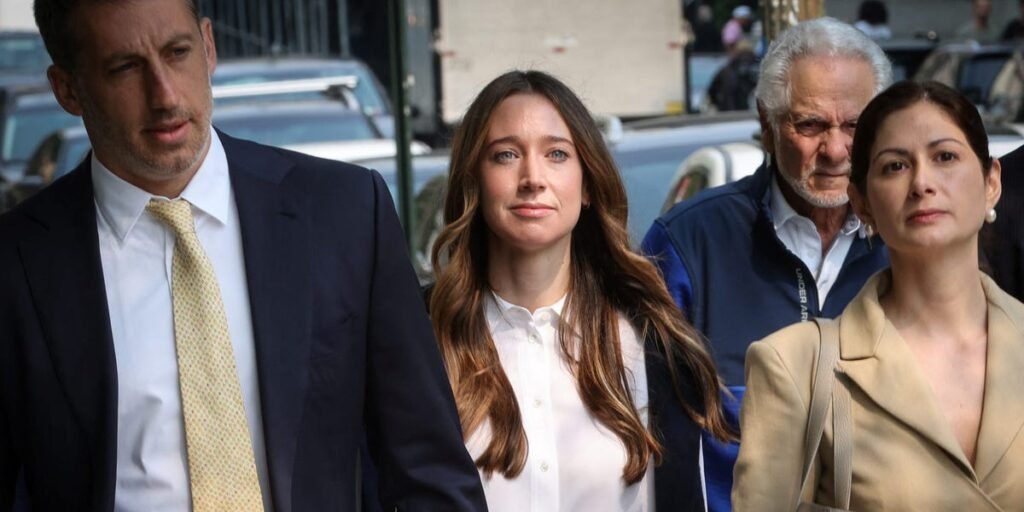- Charlie Javice is on trial over fraud claims after selling the student-aid startup Frank to JPMorgan.
- BI saw an email from Javice’s legal team asking colleagues not to discuss the case at work.
- A partner wrote that Javice, “a young woman who looks like one of us,” might overhear any remarks.
Lawyers at Quinn Emanuel Urquhart & Sullivan were urged to keep quiet around the office about Charlie Javice ahead of the startup founder’s criminal fraud trial — lest the defendant herself should overhear them.
In an email to the New York office sent Friday, Sara Clark, a Quinn Emanuel partner working on Javice’s legal team, reminded colleagues that the trial for Javice, the now-31-year-old who founded the college financial aid startup Frank, would begin in Manhattan on Tuesday and that “the case is somewhat high profile.”
“Our client, Charlie Javice, is a young woman who looks like one of us, and will be around the office the next few weeks,” Clark wrote. Javice’s legal team includes lawyers from the law firms Quinn Emanuel and Mintz, as well as the Harvard law professor Ronald Sullivan Jr. and the criminal defense attorney Jose Baez, who successfully defended Casey Anthony.
Adding that lawyers from Mintz would also probably be in the building, Clark asked employees to “not comment on the Javice case in public spaces or in any capacity in which you could be overheard by the client or our co-counsel,” adding: “We appreciate your discretion.”
“We strive to maintain a high level of confidentiality and respect when hosting clients,” Quinn Emanuel said in a statement. “It’s a large law firm, and this client is at our office for an extended period of time, of a similar in age to many of the associates and junior partners in our office, and dressed for court.”
Javice, a Wharton grad, was a rising tech superstar who founded Frank in 2017. She received glowing press and a spot on the Forbes 30 Under 30 list. After JPMorgan purchased the startup for $175 million in 2021, partly to gain access to its users, the bank became suspicious that Javice and the Frank executive Olivier Amar had inflated their user base to boost the startup’s value.
In January 2023, JPMorgan sued Javice and Amar, alleging that they had used “synthetic data” to fabricate millions of customers who didn’t exist. A few months later, the Justice Department and securities regulators also filed complaints against Javice alleging wire fraud and bank fraud, among other charges. Since then, Javice had been out on a $2 million bond in Miami, awaiting the criminal trial in Manhattan. In November, in a letter to the judge, one of Javice’s attorneys asked the court to remove the requirement that she wear a GPS ankle monitor because it “impeded her work as a fitness instructor.” (The judge agreed.)
The trial is expected to last about four weeks. In a pretrial hearing, US District Judge Alvin K. Hellerstein denied a request to grant Javice and Amar separate trials; Javice’s team made the request upon learning that Amar planned to launch what it called an “antagonistic” defense against their client. The Judge also barred prosecutors from mentioning Theranos or its founder, Elizabeth Holmes. In particular, he said prosecutors could not introduce WhatsApp messages between Javice and Amar in which Javice hoped for “light sentencing” for Holmes and said Theranos investors should be blamed for “letting a 19 year old go rogue.”
The prosecution has also taken issue with Javice’s legal team. On Tuesday morning, the acting US attorney in Manhattan asked a judge overseeing the case to clamp down on public commentary from Javice’s legal team. The letter came after the Financial Times quoted a spokesperson for Baez, one of the defense lawyers, as saying that claims about Frank inflating its users could be undercut by a Google search.
“Focus on the July 2021 timeframe and I think you’ll find about two dozen articles” that refer to Frank having hundreds of thousands of users, not millions, the spokesperson was quoted as saying. “It was out there in public.”
Prosecutors said the comment was improper because it invited “potential jurors to conduct their own inquiry into factual matters well beyond the scope of admissible evidence.”
Both Javice and Amar could face prison time if convicted, with bank fraud, the most serious of the charges, carrying a sentence of up to 30 years. Both have pleaded not guilty.
Read the full article here
















